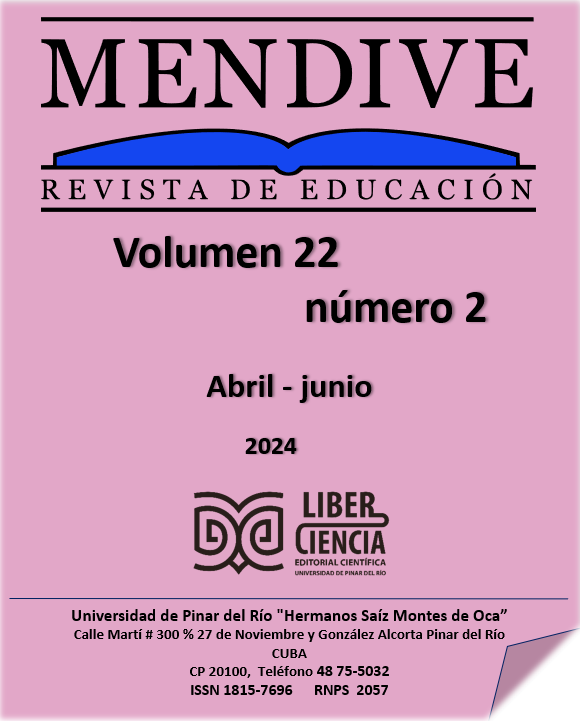Digital competencies and attitude towards research in aspiring elementary school teachersng elementary school teachers
Main Article Content
Abstract
The aim of the research was to identify the relationship between digital competencies and attitude towards research in students from the Faculty of Education of a public university in Lima. The research design was non-experimental, cross-sectional correlational. The sample consisted of 212 undergraduate students. The method used was survey plus two instruments to collect information: Students' Digital Competence Scale (SDiCoS), which consisted of 6 components (Tzafilkou and Perifanou, 2022) and the Attitude towards Research Scale (EACIN), consisting of 28 items grouped in three dimensions (Aldana, et al., 2020). The results showed that there is a statistically significant relationship between digital competencies and students' attitude towards research. Likewise, a direct and positive relationship was found between the dimensions "disinterest in research and search and storage of information" and "vocation for research and content creation". The research concluded that, while digital competencies are related to the attitude towards research, their development might be influenced by other factors such as initial research training, motivation and the use of materials and resources that allow students to value research more.
Downloads
Article Details

This work is licensed under a Creative Commons Attribution-NonCommercial 4.0 International License.
References
Adebisi, Y. (2022). Undergraduate students' involvement in research: Values, benefits, barriers and recommendations. Annals of Medicine & Surgery, 81, DOI: 10.1016/j.amsu.2022.104384
Aldana, G., Babativa, D., Caraballo, G. & Rey, C. (2020). Escala de actitudes hacia la investigación (EACIN): evaluación de sus propiedades psicométricas en una muestra colombiana. CES Psicología, 13(1), 89-103. https://doi.org/10.21615/cesp.13.1.6
Antúnez, A. & Veytia, M. (2020). Desarrollo de competencias investigativas y uso de herramientas tecnológicas en la gestión de información. Conrado, 16(72), 96-102. http://scielo.sld.cu/scielo.php?script=sci_arttex t&pid=S199086442020000100096&lng=es&tlng=es
Candra, A., Erszsébet, K. (2023). Attitudes towards science in higher education: Validation of questionnaire among science teacher candidates and engineering students in Indonesia. Heliyon, 9, https://doi.org/10.1016/j.heliyon.2023.e20023
Cheng, H. & Chen, L. (2022). Investigating how student-centered and teacher-centered teaching paradigms relate to the academic motivation and learning behaviors of secondary school students in China (Explorando las relaciones entre los modelos pedagógicos centrados en el estudiante y centrados en el docente y la motivación académica y conductas de aprendizaje de los estudiantes de secundaria en China). Journal for the Study of Education and Development, 45(4), 906-938. https://doi.org/10.1080/02103702.2022.2096299
Chu, S., Chow, K., Tse, S.K. & Collier, C. (2008). Grade Students Development of Research Skills Through Inquiry-Based Learning Projects. School Libraries Worldwide, 14(1), 10-37 https://bit.ly/3OQCiCU
Cruz T., Pinedo Z. & Lescano C. (2021). Actitud hacia la investigación: un análisis afectivo, cognoscitivo y conductual en estudiantes universitarios. Revista Iberoamericana de Tecnología en Educación y Educación en Tecnología, (29) 20-26, 2021. doi: 10.24215/18509959.29.e2
García-Martínez, J., Fuentes-Abeledo, E., Rodríguez-Machado, E., (2021). Attitudes towards the Use of ICT in Costa Rican University Students: The Influence of Sex, Academic Performance, and Training in Technology. Sustainability, 13(1), 282. https://doi.org/10.3390/su13010282
George, C. & Ramírez, A. (2019). Competencias investigativas y saberes digitales de estudiantes de Posgrado en la modalidad virtual. Certiuni Journal, 0(5), 6578. http://uajournals.com/ojs/index.php/certiunijournal/article/view/605
González, Y. (2017). ¿Cómo evaluar la competencia investigativa desde la responsabilidad social universitaria? Revista Cubana de Educación Superior, 36, (2), 4 13. https://revistas.uh.cu/rces/article/view/3247
Hernández, R., Fernández, C. & Batista, P. (2014) Metodología de la investigación. Mc Graw Hill. http://www.rces.uh.cu/index.php/RCES/article/view/178/222
Hernández-Sampieri, R. & Mendoza, C. (2018). Metodología de la investigación. La Rutas cuantitativa, cualitativa y mixta. Editorial Mc Graw Hill Education.
Khine, M. S. (Ed.). (2015). Attitude measurements in science education: Classic and contemporary approaches. IAP.
Mena, M. & Lizenberg, N. (2013). Desarrollo de competencias investigadoras en la sociedad red. RED Revista de Educación a Distancia, (38). https://www.um.es/ead/red/38/
Perdomo, B., González, O. & Barrutia I. (2020). Competencias digitales en docentes universitarios: una revisión sistemática de la literatura EDMETIC, 9(2), 92-115. https://doi.org/10.21071/edmetic.v9i2.12796
Reyes, S., Valderrama, O., Atoché, R., Reyes, R. & Arotoma, M. (2023). Actitudes de los estudiantes de universidades públicas hacia la investigación. Comuni@cción: Revista de Investigación en Comunicación y Desarrollo, 14(2), 137-147. https://doi.org/10.33595/2226-1478.14.2.847
Reyes P., Cárdenas, M. & Gavilánez, T. (2020). Desarrollo de competencias investigativas mediadas por tecnologías en estudiantes de la carrera de Agronomía. Revista Conrado, 16(73), 108-113. https://conrado.ucf.edu.cu/index.php/conrado/article/view/1278
Rubio, M., Torrado, M.; Quirós, C.; Valls, R. (2018). Autopercepción de las competencias investigativas en estudiantes de último curso de Pedagogía de la Universidad de Barcelona para desarrollar su Trabajo de Fin de Grado. Revista Complutense de Educación, 29(2), 335-354. https://doi.org/10.5209/RCED.52443
Rojas, N. (2019). Enseñanza de la competencia investigativa: percepciones y evidencias de los estudiantes universitarios. Revista Espacios, 40(41). https://www.revistaespacios.com/a19v40n41/a19v40n41p26.pdf
Otzen, T. & Manterola, C. (2017). Técnicas de muestreo sobre una población a estudio. Int. J. Morphol., 35(1):227-232, 2017. http://dx.doi.org/10.4067/S0717-95022017000100037
Obi, C., Ekonesi, R., Amba, H., Okpa, J., Edet, U., & Anari, M. (2022). Students' attitude and academic achievement in a flipped classroom. Heliyon 8(2022). https://doi.org/10.1016/j.heliyon.2022.e08792
Tzafilkou, K., Perifanou, M. & Economides, A. Development, and validation of students' digital competence scale (SDiCoS). lnternational Journal of Educational Technology in Higher Education (2022) 19, 30. https://doi.org/10.1186/s41239-022-00330-0
Comisión Europea (2018). Propuesta de recomendación del consejo sobre competencias para el aprendizaje a lo largo de la vida. https://ec.europa.eu/education/sites/education/files/annex-recommendation-key-competences-lifelong-learning.pdf


